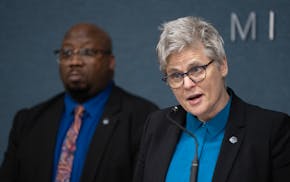Opinion editor's note: Star Tribune Opinion publishes a mix of national and local commentaries online and in print each day. To contribute, click here.
•••
Earlier this month, Dr. Hilary Cass submitted a report and recommendations to NHS England, of a systematic review of gender services offered by that country's National Health Service and of the evidence base for gender-affirming care. Cass is a respected pediatrician, who, among other roles, served as president of the Royal College of Paediatrics and Child Health from 2012 to 2015.
NHS England commissioned Cass to make recommendations on how to improve NHS gender identity services and ensure that children and young people who are experiencing gender distress receive a high standard of care that meets their needs, and is safe, holistic and effective.
A systematic review is one that uses explicitly defined methods to search for and appraise the quality of published research data and to synthesize the results of studies which meet established quality standards. The study enlisted the help of a Research Ethics Committee and commissioned a Centre for Reviews and Dissemination for the systematic review of the literature and a systematic appraisal of international guidelines used in gender care. The review also included carefully designed stakeholder engagement and interviewed or listened to more than 1,000 patients, family members and providers.
A summary of the findings of the Cass Review, as well as a link to the full report, can be found at tinyurl.com/cass-final.
The report took four years to complete and is 388 pages in length. It is interesting reading, but if you are pressed for time, it will be more expedient to consider this response from the editor-in-chief of the British Medical Journal: "The evidence base for interventions in gender medicine is threadbare, whichever research question you wish to consider — from social transition to hormone treatment." Editors of medical journals do not often use words like "threadbare."
Questions about the evidence base for gender-affirming care are not new. The Cass Review represents the fourth European country to conduct a review and to restrict the use of puberty blockers and cross-sex hormones.
The medical establishment in the U.S. is an increasingly distant outlier in this area. Last August, under pressure, the American Academy of Pediatrics initiated its own systematic review of the evidence, but at the same time, restated its commitment to gender-affirming care. It will be an unusual systematic review if it finds an evidence base for this position.
Most major medical associations in the U.S., as well as the state of Minnesota itself, support the model of treatment of gender-distressed young people known as gender-affirming care. Per the Minnesota Department of Health, these treatments "have to do with changing secondary sexual characteristics like voice pitch, absence/presence of breast tissue, body hair, and body fat distribution, or delaying these changes from occurring using puberty blockers." MDH states that these treatments help to alleviate gender dysphoria and improve mental well-being by aligning a person's physical characteristics with their gender identity, and that this approach is supported by scientific evidence.
The Cass Review finds otherwise.
The NHS will no longer simply refer young people to gender clinics, but will implement a distributed service model to provide treatment in a holistic way — in other words, treatment that is not guided by gender specialists, and that will use standard, evidence-based psychological and psychopharmacological approaches. From the report: "For most young people, a medical pathway will not be the best way to manage their gender-related distress." The use of puberty blockers will be limited to research settings.
The concept of gender identity is central to the model of gender-affirming care and to related prohibitions on conversion therapy. The idea is that people are born with a "gender identity" that only they can know, the enactment of which results in living an authentic life. This echoes the politically successful narrative around homosexuality, and supports the idea that conversion therapy is harmful and ineffective.
However, gender identity is a philosophical concept. It may be a good model for describing some patients, but it does not explain the surge in young people seeking care for gender distress. The current population is a strikingly different group from those treated in the original studies. It is increasingly clear that the causes of gender distress are diverse and are not easily explained by the concept of being "born that way."
Since around 2014, many countries have noted a dramatic rise in youth experiencing gender distress, a change of age of onset from early childhood to adolescence, a reversal of biologic sex from predominantly male to predominantly female, an increase in a nonbinary identity, and an increase in co-occurring mental and psychosocial needs prominently including depression, anxiety, body dysmorphic disorder, autism spectrum disorder and adverse childhood experiences. A high incidence of same-sex attraction has characterized the patient population since the beginning.
These young people bring a host of complex needs, not easily summarized by the concept of gender identity. Unfortunately, this may reflect an increase in mental health challenges and emotional distress among the broader adolescent population, which has risen among boys and girls, but more among girls and young women, and is thought to be fueled by a complex set of factors, including factors which have been collectively described as "social contagion."
The Cass Review included a systematic review of 19 international, national and regional guidelines. Notably, most of the guidelines themselves noted insufficient evidence about the risks and benefits of medical treatment of adolescents, but, despite this, they cited this same evidence in their strong treatment recommendations. They also frequently cited one another. From Cass: "The circularity of this approach may explain why there has been an apparent consensus on key areas of practice despite the evidence being poor."
Few of the guidelines reviewed recommended formal measures or clinical tools to diagnose gender dysphoria, and the formal measures which were observed were found to be poorly validated. Per the report: "A formal diagnosis of gender dysphoria is … not reliably predictive of whether that young person will have longstanding gender incongruence in the future, or whether medical intervention will be the best option for them. Depending on what has caused their distress or dysphoria, it may be resolved by medical treatment, but it may also be resolved in other ways."
In short, the evidence base for gender-affirming care is not what is claimed by either activists or by those who write guidelines, including prominent U.S. professional medical associations. The philosophical concept of "gender identity" is not an effective model for understanding the natural history of gender dysphoria.
Legislation is not a good way to create medical guidelines. Neither the prohibition nor the support of gender-affirming care through legislative action is wise. Unfortunately, U.S. professional medical associations failed in their leadership role by taking partisan rather than evidence-based positions, in a betrayal of their duty to patients and families and of their trusted role. This has only added to the divisiveness of this issue. Their leadership could have dampened the move toward legislative prohibitions in red states and provided better guidance to those in government who are concerned about gender-distressed young people. Clinical care should be guided by neither legislation nor by ideology; it should be guided by evidence.
Our state has an explicit position of support for gender-affirming care, and a corresponding prohibition on conversion therapy, which can have a dampening effect on the provision of other modalities of treatment. I call upon Gov. Tim Walz and our legislative leaders to reevaluate this stance, and to begin the hard work of establishing guidelines for a high standard of care that is safe, holistic and effective, such as the one that the Cass report outlines for the NHS.
Virginia Dale, of Minneapolis, is a physician. For additional commentary about the Cass Review, see "The courage to follow the evidence on transgender care," by New York Times columnist David Brooks, published by Star Tribune Opinion online on April 19 (tinyurl.com/brooks-cass).

BWCA's future likely hinges on election
Saving the dinosaurs: Why there's a future for community newspapers
Readers Write: Gun storage laws, Uber and Lyft, 24/7 businesses, the pipe organ


